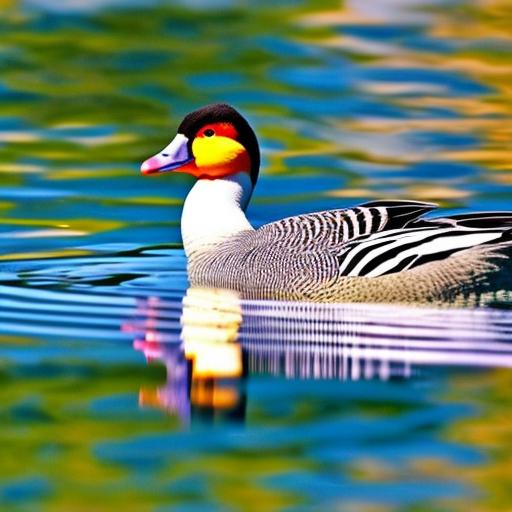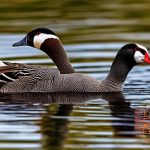Geese can be a nuisance when they invade pool areas, leaving behind droppings and causing potential damage. Understanding their behavior is crucial in finding effective ways to keep them out. By implementing various strategies such as physical barriers, scare tactics, pool covers, and maintaining a clean pool area, you can discourage geese from making your pool their home. It is important to educate yourself and others about geese control and be patient and persistent in your efforts.
Key Takeaways
- Geese are attracted to pools because they provide a source of water and food.
- Geese can pose health risks and cause damage to pool areas.
- Physical barriers such as fences and netting can effectively keep geese out.
- Decoys and scare tactics such as noise makers and motion-activated sprinklers can deter geese.
- Installing pool covers can prevent geese from entering and also keep the pool clean.
Understanding the behavior of geese around pools
Geese are attracted to pools for several reasons. Firstly, pools provide a source of water for drinking and bathing, which is essential for their survival. Additionally, the surrounding grassy areas near pools offer a food source for geese, as they graze on grass and other vegetation. Geese are also attracted to pools because they provide a safe and open space for nesting.
Geese are known to be territorial creatures, especially during the nesting season. They will defend their nesting sites aggressively against perceived threats, including humans. This territorial behavior can lead to confrontations and potential harm to pool users. Understanding these behaviors can help in finding effective ways to deter geese from pool areas.
Assessing the risk of geese in your pool area
The presence of geese in pool areas can cause various problems. Firstly, their droppings can create an unsightly mess and pose health risks. Geese droppings contain bacteria that can contaminate the water and cause illnesses such as E.coli and salmonella. Additionally, the acidic nature of their droppings can damage pool surfaces and equipment.
Furthermore, geese can cause damage to pool areas by trampling on vegetation, digging up lawns, and creating nests in inconvenient locations. Their aggressive behavior during nesting season can also pose a threat to pool users, especially children. Assessing the potential risks associated with geese in your pool area is important in determining the appropriate measures to take.
Implementing physical barriers to keep geese out
One effective way to keep geese out of pool areas is by implementing physical barriers. Fences and netting can be used to create a physical barrier that prevents geese from accessing the pool. Fences should be at least three feet high and have small openings to prevent geese from squeezing through. Netting can be installed over the pool area to create a barrier that prevents geese from landing.
Proper installation of these barriers is crucial for their effectiveness. Fences should be securely anchored to the ground to prevent geese from pushing under or flying over them. Netting should be taut and securely fastened to prevent geese from getting entangled. Regular inspections and maintenance of these barriers are necessary to ensure their continued effectiveness.
Using decoys and scare tactics to deter geese
Decoys can be used as a scare tactic to deter geese from pool areas. Geese are social creatures and are more likely to avoid areas where they perceive a threat. Decoys such as plastic owls or coyotes can be placed near the pool area to create the illusion of a predator presence. Moving decoys can be even more effective, as they mimic the movement of a real predator.
Other scare tactics that can be used include noise makers and motion-activated sprinklers. Noise makers such as air horns or whistles can startle geese and make them uncomfortable, causing them to leave the area. Motion-activated sprinklers can also be effective in deterring geese, as they activate when geese approach, spraying water and scaring them away.
Installing pool covers to prevent geese from entering

Installing a pool cover is another effective way to prevent geese from entering pool areas. Pool covers create a physical barrier that prevents geese from accessing the water. They also help to keep the pool clean and reduce the risk of contamination from geese droppings. There are different types of pool covers available, including solid covers and mesh covers.
Solid covers completely cover the pool and prevent geese from accessing the water. Mesh covers allow water to pass through while still providing a barrier that prevents geese from entering. It is important to choose a cover that is appropriate for your pool and ensure that it is properly installed and secured.
Maintaining a clean pool area to discourage geese
Keeping the pool area clean is important in discouraging geese from making it their home. Geese are attracted to areas with an abundant food source, so removing any food sources can help deter them. Regularly clean up any fallen leaves, grass clippings, or other organic debris that can attract geese. Use pool skimmers and vacuums to remove any floating debris from the water.
Additionally, maintaining a well-manicured lawn can discourage geese from grazing in the area. Geese prefer longer grass, so regularly mow the lawn to keep it short. Removing any standing water or puddles can also help in reducing their attraction to the pool area.
Removing food sources that attract geese to your pool
Geese are attracted to certain types of food, so removing these food sources can help deter them from your pool area. Geese are herbivores and primarily feed on grass and other vegetation. Avoid overwatering your lawn, as this can create lush grass that is attractive to geese. Consider planting less attractive grass varieties or using landscaping techniques that make it difficult for geese to access the grass.
Proper garbage disposal is also important in reducing food sources for geese. Ensure that garbage cans are securely covered and do not overflow. Clean up any spilled food or garbage promptly to avoid attracting geese.
Seeking professional help for persistent geese problems
In some cases, persistent geese problems may require the assistance of professionals. Wildlife control experts or pest control companies can provide effective solutions for geese control. They have the knowledge and experience to assess the situation and implement appropriate measures to deter geese from your pool area.
Additionally, contacting local authorities or wildlife agencies can provide guidance and resources for dealing with geese problems. They may have programs in place to help manage geese populations and provide advice on effective deterrent methods.
Educating neighbors and community members about geese control
Educating neighbors and community members about geese control is important in creating a collective effort to keep geese out of pool areas. Many communities face similar issues with geese, so sharing information and strategies can be beneficial for everyone. Organize community meetings or distribute educational materials to raise awareness about the problem and discuss potential solutions.
Working together with neighbors and community members can also help in implementing more effective deterrent methods. By coordinating efforts, you can create a larger presence that is more likely to deter geese from pool areas.
Being patient and persistent in your efforts to keep geese out
It is important to be patient and persistent in your efforts to keep geese out of your pool area. Geese are persistent creatures, and it may take time to see results from your deterrent methods. It is important to consistently implement the strategies discussed and make adjustments as needed.
Remember that persistence is key in successfully deterring geese. By consistently applying deterrent methods, you can create an environment that is less attractive to geese and encourage them to find alternative locations.
Geese can be a nuisance when they invade pool areas, but understanding their behavior and implementing effective deterrent methods can help keep them out. By using physical barriers, scare tactics, pool covers, maintaining a clean pool area, removing food sources, seeking professional help when needed, and educating others, you can discourage geese from making your pool their home. Remember to be patient and persistent in your efforts, as it may take time to see results. Take action now to keep geese out of your pool area and enjoy a clean and safe swimming environment.
If you’re wondering how to keep geese out of your pool, you may also be interested in learning about what geese can eat. Poultry Wizard has a helpful article on whether geese can eat chicken feed. Understanding their dietary needs can provide insights into how to deter them from your pool area. Check out the article here for more information.
FAQs
What are some common problems caused by geese in pools?
Geese can cause a variety of problems in pools, including leaving droppings, damaging pool covers, and potentially spreading diseases.
What are some effective ways to keep geese out of a pool?
Some effective ways to keep geese out of a pool include using pool covers, installing decoys or scare devices, and using fencing or netting.
Are there any natural methods for keeping geese away from a pool?
Yes, there are natural methods for keeping geese away from a pool, such as planting certain types of vegetation or using natural repellents like vinegar or garlic.
Is it safe to use chemicals to deter geese from a pool?
While there are chemical repellents available for deterring geese, it is important to use them carefully and according to the manufacturer’s instructions to avoid any potential harm to humans or the environment.
What should I do if I find geese in my pool?
If you find geese in your pool, it is important to avoid approaching them and to contact a professional wildlife removal service for assistance in safely and humanely removing them.
Meet Walter, the feathered-friend fanatic of Florida! Nestled in the sunshine state, Walter struts through life with his feathered companions, clucking his way to happiness. With a coop that’s fancier than a five-star hotel, he’s the Don Juan of the chicken world. When he’s not teaching his hens to do the cha-cha, you’ll find him in a heated debate with his prized rooster, Sir Clucks-a-Lot. Walter’s poultry passion is no yolk; he’s the sunny-side-up guy you never knew you needed in your flock of friends!







